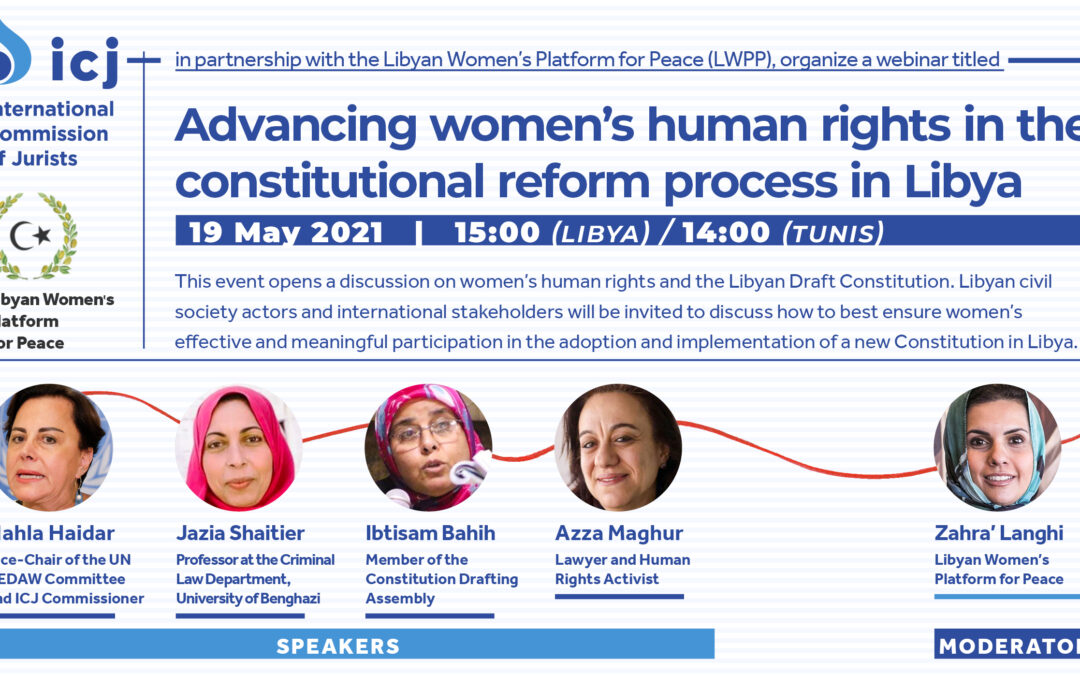
May 19, 2021 | News
The International Commission of Jurists (ICJ) and the Libyan Women’s Platform for Peace (LWPP) on 19 May 2021 convened a webinar on ‘Advancing women’s human rights in the constitutional reform process in Libya’.
The webinar was moderated by Zahra’ Langhi, co-founder and director of LWPP, with speakers: Jaziah Shaitier, Professor at the Criminal Law Department, University of Benghazi; Ibtisam Bahih, member of the Constitution Drafting Assembly; Nahla Haidar, Vice-Chair of the UN Committee on the Elimination of Discrimination against Women and an ICJ Commissioner from Lebanon; and Azza Maghur, a Libyan lawyer.
In her opening remarks, Zahra’ Langhi stressed that advancing women’s rights in in the constitutional reform process should not be limited to the protections of women’s rights in the draft Constitution, which were any way inadequate, but also the effective the participation of women in the entire constitutional-making process
Jaziah Shaitier focused her remarks on the limitations the Constitution:
“I had hoped that the constitutional process that followed the Revolution would state clearly that any person born to a Libyan father or a Libyan mother would be Libyan.”
“Libya needs gender-inclusive constitutional provisions, and implementing laws that would protect women against all forms of violence”, Shaitier said.
Langhi pointed out that Libyan women who are married to non-Libyans cannot even access essential COVID-19 vaccines.
Nahla Haidar spoke of the importance of states to comply with their obligations under the Convention on the Elimination of All Forms of Discrimination against Women (CEDAW), a treaty to which Libya is a party:
“Sharia’s place within the Constitution should be made clear, otherwise there would be no need for a Constitution at all.”
Haidar also stressed the need to address problematic provisions in the Libyan Draft Constitution, including draft discriminatory provisions and provisions perpetuating stereotypes about the role of women and men in society and in the family. “Women may also choose not to start a family at all, and that should not have any bearing on the enjoyment of their rights.”
Azza Maghur highlighted the inadequate representation of women in the Libyan constitutional process:
“Libyans dreamed of a Constitution that is theirs, one that guarantees rights and liberties. The representation of women was not adequate.”
A member of the Constitution Drafting Assembly herself, Dr Ibtissam Bahih, highlighted how the process had failed Libyan women, and how the need for reform was as urgent as ever.
You can watch the full webinar here.
Contact:
Said Benarbia, Director, ICJ Middle East and North Africa Programme, t: +41-22-979-3817; e: said.benarbia(a)icj.org
Asser Khattab, Research and Communications Officer, ICJ Middle East and North Africa Programme, e: asser.khattab(a)icj.org
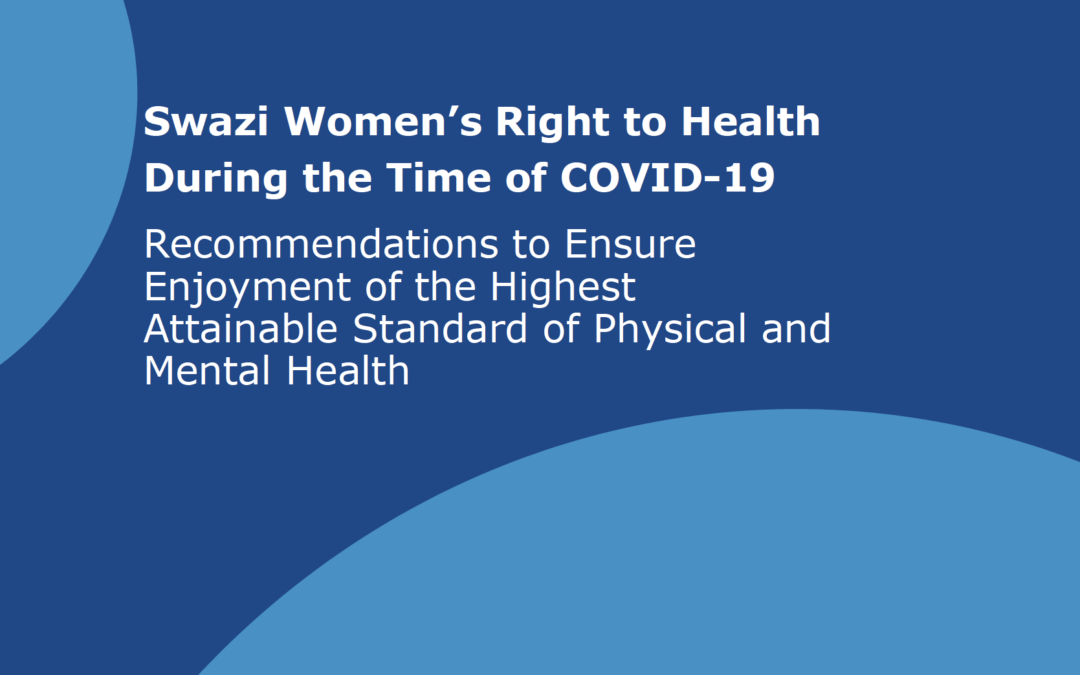
Mar 8, 2021 | Advocacy, Analysis briefs
On International Women’s Day 2021, the ICJ publishes a paper considering the ways in which women in Eswatini face systematic discrimination in laws and practices, in violation of the country’s obligations under international human rights law with respect to women and girls’ right to health, including sexual and reproductive health.
The publication concludes with recommendations to the Eswatini authorities on how they may enhance women and girls’ ability to fully and equally benefit from and enjoy their right to health and their other human rights without discrimination.
The paper is entitled “Swazi Women’s right to health during the time of COVID-19: Recommendations to ensure enjoyment of the highest attainable standard of physical and mental health”. It was launched through a conversation with Zanele Thabede-Vilakati, the National Director of Women and Law in Southern Africa (WLSA) Research and Educational Trust in Eswatini. In the discussion, Thabede-Vilakati outlined the obstacles faced by Swazi women before and after the COVID-19 pandemic. Talking about the ICJ publication, she added:
“The ICJ report on Swazi Women’s Right to Health during COVID-19 is an in-depth observation of all the issues which women face in their daily lives in getting access to their basic right to health. The recommendations made by the ICJ can only enrich Eswatini authorities’ approach to protecting and empowering women and I hope that they take these recommendations on.”
The report considers Eswatini’s obligations not only under national law, including under the Swazi Constitution, but also under international law in an effort to assess whether Eswatini is complying with its human rights obligations.
The report reflects on the obstacles that Swazi women have faced before and during the COVID-19 pandemic in exercising their right to health. Some of the key human rights concerns include: lack of access to sexual and reproductive healthcare; the high prevalence of HIV/AIDS among Swazi women; obstacles in accessing sexual and gender-based violence-related healthcare services; and inadequate access to shelters and housing for women in Eswatini.
Based on the publication’s assessment, recommendations are addressed to Eswatini authorities for specific measures to be taken to protect women, as well as meet Eswatini’s obligations under national, regional and international law.
Speaking about the report, ICJ’s Africa Regional Programme Director, Kaajal Ramjathan-Keogh stated,
“The right to health is a crucial right to everyone, but in a country such as Eswatini – one of the most severely HIV affected countries in the world – women’s right to health is a priority as women remain disproportionally affected by HIV. We hope that this report and its recommendations cause the relevant actors to reflect on ways in which they can assist Swazi women, especially in light of the increased obstacles that women have faced in accessing their right to health due to the COVID-19 pandemic.”
In order to realize the right to health of women and girls in Eswatini, the report recommends that the Eswatini authorities take certain measures, including the following:
- Ensure access to family planning health services for all women and LGBT persons;
- Parliament must enact domestic legislation, which clarifies the circumstances under which abortion is legally available to women;
- Ensure all health facilities, throughout the country, are equipped with all essential medicines;
- Guarantee access to information and education on sex, sexuality, HIV, sexual and reproductive rights especially for adolescents and youth;
- Prioritise the provision of pre- and post-natal healthcare services in a manner that does not risk COVID-19 transmission; and
- Repeal discriminatory laws, policies and practices in the area of sexual and reproductive health, including restrictive abortion laws and laws and policies that discriminate against LGBT persons;
- Adopt legislation providing for legal aid to enable victims of gender-based violence to be better able to access justice and effective remedies for SGBV, including through courts;
- Ensure comprehensive services for survivors of sexual and gender-based violence are available during the pandemic;
- Increase access to healthcare services for victims and survivors of gender-based violence, including medical and psychosocial support and ensure adequate rape kits in all health centres; and
- Increase access to shelters and alternative accommodation for victims of gender based and domestic violence in Eswatini, including accommodation or shelters that should be made available in all parts of the country.
Background
Eswatini is a monarchy. Under its Constitution, customary law, except insofar as it is inconsistent with the former, is recognized as part of Eswatini’s legal system in addition to common law and statutory law. Eswatini is party to several binding international, including regional, human rights treaties guaranteeing the right to health, including sexual and reproductive health, for everyone, including women and girls. Irrespective of the protections afforded in Eswatini’s domestic legal system, as a matter of international human rights law, Eswatini is bound to fulfil its obligations to realize the right to health, including sexual and reproductive health.
Contact
Nokukhanya (Khanyo) Farisè, Legal Adviser (Africa Regional Programme), e: nokukhanya.farise(a)icj.org
Tanveer Jeewa, Communications Officer (Africa Regional Programme), e: tanveer.jeewa(a)icj.org
Download
Eswatini-Swazi Women Right to Health during COVID19-Report-2021-ENG
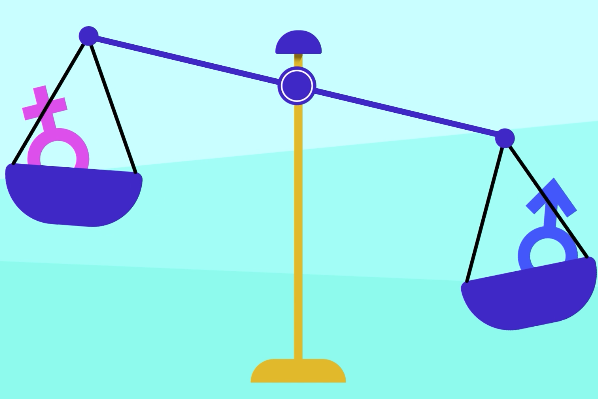
Dec 16, 2020 | News
Dialogue between Swazi Women Human Rights Defenders and CEDAW Committee Members highlights the obstacles faced by local women in the enjoyment of their human rights.
On 14 December 2020, the ICJ and the Southern Africa Human Rights Defenders Network (SAHRDN) facilitated a fruitful dialogue between Swazi Women Human Rights Defenders (WHRD) and members of the UN Committee on the Elimination of Discrimination against Women (the CEDAW Committee) on the key human rights concerns facing Swazi women and possible advocacy strategies to address them.
The CEDAW Committee monitors State parties’ compliance with and implementation of their human rights obligations under the UN Convention on the Elimination of All Forms of Discrimination against Women (the Convention), by which Eswatini is bound.
In light of the Eswatini government’s failure to submit a report to the CEDAW Committee, as required under the Convention, more than 20 Swazi WHRDs’ organizations had a preparatory meeting on 8 December to discuss and prioritize the human rights concerns they wished to bring to the CEDAW Committee members’ attention.
They hoped that, by coming together and agreeing on these issues, they may raise awareness and put pressure on the Eswatini government to comply with its obligations under the Convention, including by promptly submitting the country’s overdue report.
In the wake of this preparatory meeting, on 14 December Swazi WHRDs briefed the CEDAW Committee members about the most critical human rights violations faced by women in Eswatini. This meeting was broadcasted live on Facebook.
The dialogue focused on the Eswatini authorities’ failure to implement their human rights obligations under the Convention, including the previous Concluding Observations of the CEDAW Committee.
High rates of teenage pregnancy, women’s inadequate access to education, healthcare and adequate housing, and ways in which customary and religious laws are used to justify discrimination against them were among the key human rights concerns affecting women discussed during the dialogue.
Watch the animation on CEDAW
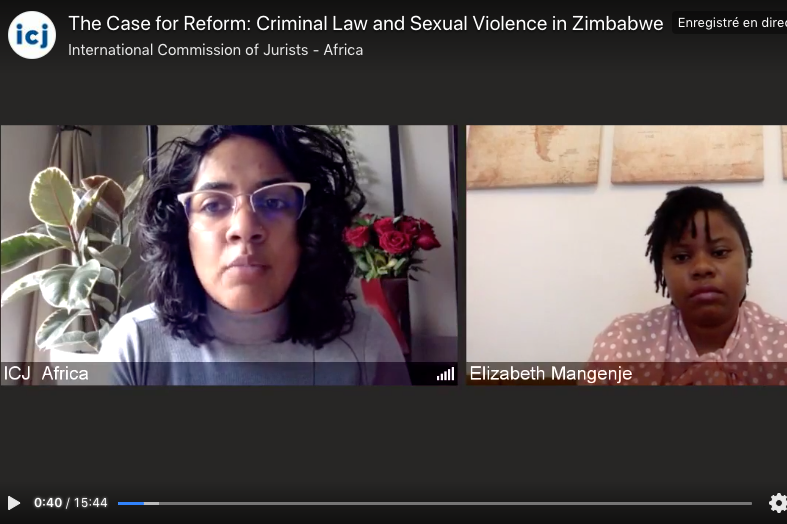
Dec 10, 2020 | News
ICJ’s 16 Days of Activism Against Gender-Based Violence underscores the need for justice systems to be more responsive.
The campaign commenced on 25 November, International Day for the Elimination of Violence against Women, and ended today on Human Rights Day. The campaign presented “an impact story” poster series, Facebook live interviews and opinion pieces on gender-based violence in Africa, Asia, Latin America, Middle East and North Africa.
The campaign underscored that harmful traditional norms and gender stereotypes provide the backdrop for the systematic and widespread abuse of women and girls’ human rights across the globe; it also emphasized the need to maintain essential services for survivors of gender-based violence (GBV) during COVID-19 lockdowns, including ensuring a continuum of adequate criminal justice response.
“Violence against women and girls around the world has increased in this global pandemic. Governments have a duty to ensure that their response to Covid-19 includes preventing such violence. For instance, all hotline services for reporting domestic violence must remain open during lockdowns and be considered part of essential services. The police must likewise be ready to act speedily if required. They must be made aware that women and girls are especially vulnerable at this time,” said ICJ Commissioner Ambiga Sreenevasan from Malaysia.
Throughout the campaign, the ICJ also underscored the ongoing need to support civil society organizations’ and women human rights defenders’ response to GBV, as well as the need to strengthen the judiciary’s capability to respond to GBV by enhancing its reliance on international human rights law and standards.
“The authorities have turned a blind eye to gender-based violence for far too long and it is time to prioritize combatting the phenomenon effectively, including through legislative reform and awareness raising,” said ICJ Commissioner Marwan Tashani from Libya.
Poster Series
Imrana Jalal (ICJ Commissioner, Fiji)
Mikiko Otani (ICJ Commissioner, Japan)
Ambiga Sreenevasan (ICJ Commissioner, Malaysia)
Marwan Tashani (ICJ Commissioner, Libya)
Kaajal Ramjathan-Keogh (ICJ Africa Regional Programme Director)
Saïd Benarbia (ICJ MENA Programme Director)
Carolina Villadiego Burbano (ICJ Legal and Policy Adviser, Latin America)
Sexual Violence & Criminal Law in Zimbabwe
Amy Alabado Avellano (Family Court Judge, Philippines)
Savithri Wijesekera (Executive Director of Women In Need, Sri Lanka)
Nahla Haidar (ICJ Commissioner, Lebanon)
Saman Zia-Zarifi (ICJ Secretary General)
Tshabalala v S (South African Constitutional Court judgment on the doctrine of common purpose applied to rape)
Infographic
The Case for Reform: Criminal Law and Sexual Violence in Zimbabwe
Facebook Live Interviews
The Case for Reform: Criminal Law and Sexual Violence in Zimbabwe with Elizabeth Mangenje (ICJ Legal Adviser, Africa Regional Programme)
The State of GBV in the Middle East and North Africa Region with Nahla Haidar El Addal (ICJ Commissioner, Lebanon)
Women’s Access to Justice – What does justice mean for women in the context of COVID-19? (Joint initiative of ICJ, UN Women, and OHCHR)
Women’s Access to Justice – What does justice mean for women prisoners? (Joint initiative of ICJ, UN Women, and OHCHR)
Op-eds
Mujeres, justicia y pandemia, by Carolina Villadiego Burbano
Yet another treaty aims to protect African women. But how will it be enforced? by Nokukhanya Farisè and Tanveer Rashid Jeewa
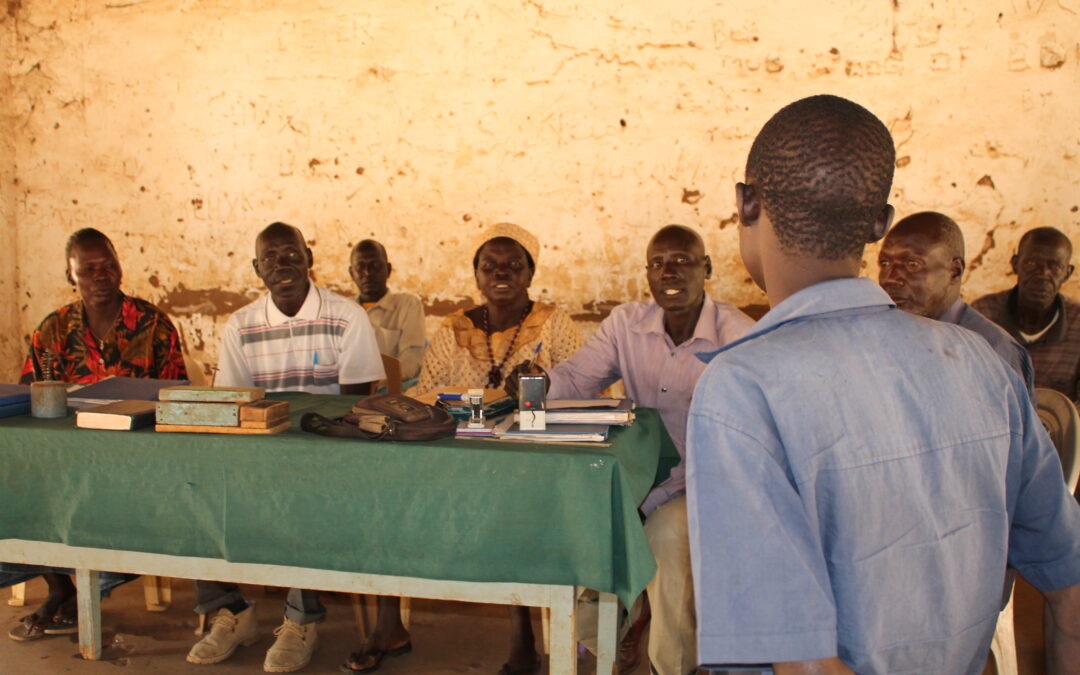
Oct 27, 2020 | Events, News
On 2-3 December 2020, the ICJ will convene the 11th annual Geneva Forum of Judges & Lawyers, on the Role of Indigenous and other Traditional or Customary Justice Systems in Access to Justice, the Rule of Law and Human Rights.
The Geneva Forum of Judges and Lawyers is an annual global meeting of senior judges, lawyers, prosecutors and other legal and United Nations experts, convened by the International Commission of Jurists (ICJ) through its Geneva-based Centre for the Independence of Judges and Lawyers.
The 8th Forum, in 2017, the 9th Forum in 2018 in Bangkok, and the 10th Forum in 2020 in Nairobi, considered the role of indigenous and other traditional or customary justice systems at the global level, as well as in the particular regional contexts of Asia and Africa.
Interim findings and recommendations were set out in the reports from the 8th, 9th and 10th Fora. The September 2019 report of the UN Special Rapporteur on the rights of indigenous peoples following her participation in the 9th Forum addressed indigenous justice..
As a reference for the Forum discussions and to assist the broader range of stakeholders, the ICJ published, and has subsequently updated, a Compilation of International Sources on Indigenous and other Traditional or Customary Justice Systems, including relevant provisions of global and regional treaties, UN and other inter-governmental declarations, and the jurisprudence and recommendations of expert Committees and Special Procedures established by treaties and the UN Human Rights Council.
The culmination of the Geneva Forum process on indigenous and other traditional or customary justice systems will be the 11th Geneva Forum on 2 and 3 December 2020, followed by publication by ICJ of a final set of global recommendations.
Due to the COVID-19 pandemic, the 11th Geneva Forum will be convened online, with participants from around the world.
Participation in the Forum is by invitation only and the Forum discussions will not be broadcast.
The concept note for the Forum may be downloaded here (PDF): GF2020 Concept Note 27-10-2020
The programme for the Forum may be downloaded here (PDF): GF2020 Programme 21-10-2020
The list of participants (subject to final confirmation) can be downloaded here (PDF): Public list of Participants_2020 ICJ Geneva Forum
For more information contact matt.pollard(a)icj.org.
The 2020 Geneva Forum of Judges & Lawyers is made possible by the support of the Republic and Canton of Geneva, Switzerland.
Photo: Traditional leaders preside over a case in B-Court, Nyang Payam, Torit County, South Sudan. Photo Credit: UNDP South Sudan2016Angelique Reid ©2016 United Nations









